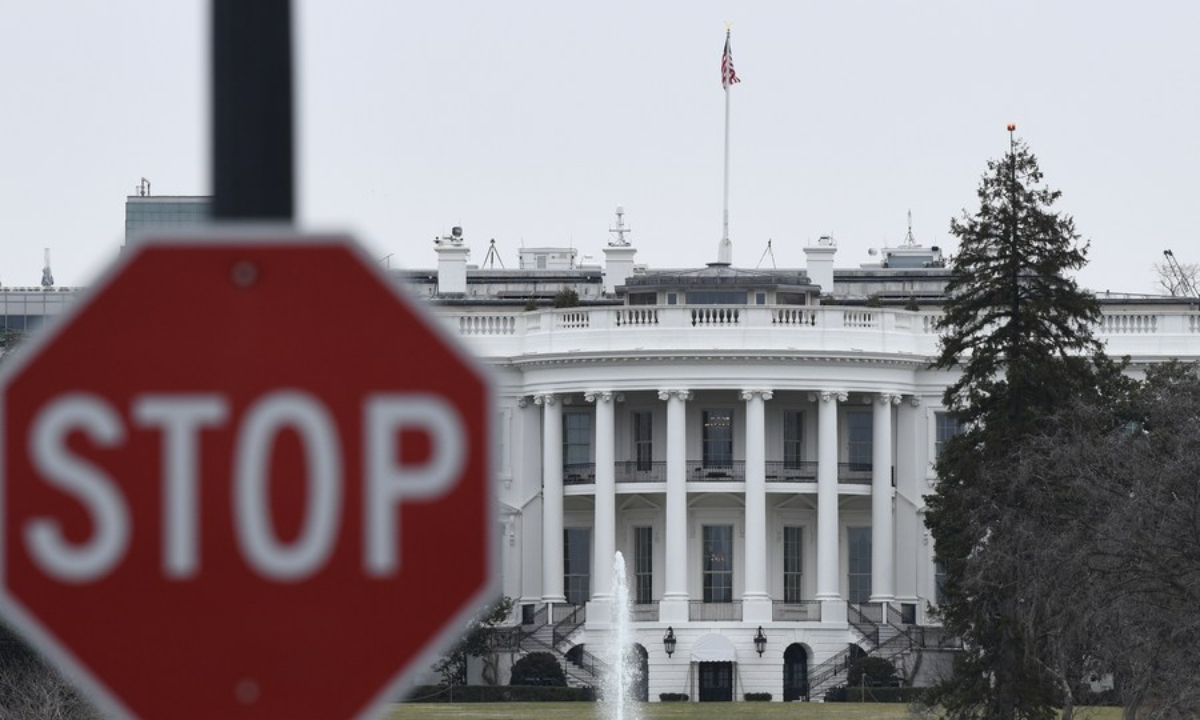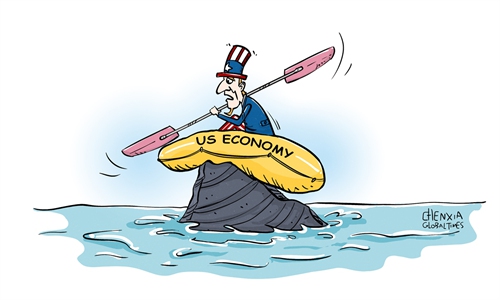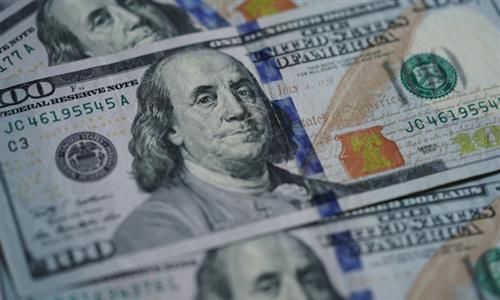
Photo taken on Jan 12, 2019 shows the White House and a stop sign in Washington D.C., the US. Photo:Xinhua
The possible shutdown of the US government later this year, after a debt ceiling crisis that rattled markets in the first half of 2023, clearly illustrates the increasingly hostile political environment in the US, and the growing partisan rivalry and confrontation will have serious consequences for the US and other major economies, analysts said.
The US government faces another possible federal shutdown after September 30, after earlier budgetary appropriations from the US Congress run out. The deadlock on the horizon is due to a lack of consensus in Congress over government spending for the fiscal year that starts in October, Goldman Sachs said in a note on Sunday.
"Domestic US economic problems, such as debt and the budget, reflect its hostile political environment. The bitter fight between the two parties will likely lead to a government shutdown, which, together with its debt ceiling crisis, will have serious consequences for the US economy and the global economy," an analyst who preferred to be called Yuguo told the Global Times on Tuesday.
The possible shutdown, which may cause the closure of US government offices and the suspension of pay, will take a direct toll on the US economy, said Yuguo.
Goldman Sachs warned that the lack of consensus in Congress on the annual budget could bring the US political system to a standstill, causing its economy to take a 0.2 percentage points hit each week.
Political rivalry
The US superstructure and the political landscape are deeply divided, and the two parties are fighting each other over the next election, which is the root cause of the debt ceiling issue and a potential government shutdown, Chen Jia, an independent analyst on global strategy, told the Global Times on Tuesday.
While a government shutdown is "more likely than not" according to Goldman Sachs, the deepening US debt woes will continue to cause volatility in global financial markets.
"Although the US has successfully passed 69 debt ceiling crises since the 1960s, since the beginning of this year, the systemic risk of the US financial system has surged, and the problem of an economic hard landing remains prominent," said Chen.
The US was already "treading on thin ice" with its debt woes, which was made worse by a massive increase in the supply of Treasury bonds since 2021, Chen said.
Yuguo said that, if the US fails to address its debt problems in time, it could lead to further credit rating downgrades and constantly rising borrowing costs, which could cause another financial turmoil.
On August 1, rating agency Fitch Ratings downgraded the US long-term bonds rating to "AA+" from "AAA."
The downgrade reflects the expected fiscal deterioration over the next three years, a high and growing general government debt burden, and the erosion of governance relative to "AA" and "AAA" rated peers over the last two decades that has manifested in repeated debt limit standoffs and last-minute resolutions, said Fitch Ratings.
In Fitch's view, there has been a steady deterioration in "standards of governance" in the US over the past 20 years, including on fiscal and debt matters, notwithstanding the June bipartisan agreement to suspend the debt limit until January 2025. The repeated debt-limit political standoffs and last-minute resolutions have eroded public confidence in fiscal management.
Fiscal deterioration
"The essence of the debt crisis and ratings downgrade is 'derivative' of the US debt ceiling crisis. Unlike in the past, the odds are high that the formula that US financial markets used to survive debt ceiling crises may fail this time," said Chen.
The US is facing its highest borrowing costs since the 2008 financial crisis, amid fears that the Federal Reserve will keep interest rates higher for longer. The yield on the 10-year US Treasury bonds rose to a 16-year high of 4.342 percent on Monday.
The US economy seems large and prosperous, but it is also a "capital bubble". Once the bubble bursts, another financial crisis may break out, causing a severe slowdown in the economy, Hu Qimu, deputy secretary general of the digital real economies integration Forum 50, told the Global Times.
Hu noted that the US has done considerable damage to the global economy by adopting unlimited quantitative easing first, and then raising interest rates too sharply, rattling global markets.
In 2022, the Fed ended its ultra-easy monetary policy and turned to aggressive interest rate hikes, causing turmoil in the international financial markets and substantial depreciation of other currencies such as the euro, many of which dropped to 20-year lows, read a report titled "US Hegemony and Its Perils" published by the Chinese Foreign Ministry in February.
As a result, a large number of developing countries are facing high inflation, currency depreciation and capital flights. The hegemony of the US dollar is the main source of instability and uncertainty in the world economy. During the COVID-19 pandemic, the US abused its global financial hegemony and injected trillions of US dollars into market, leaving other countries, especially emerging market economies, to pay the price.
This was exactly what former US president Richard Nixon's secretary of the Treasury John Connally once remarked, with self-satisfaction yet sharp precision, that "the dollar is our currency, but it is your problem."
"With its irresponsible fiscal and monetary policies, it should be said that the US is overextending the credit of the US dollar. As a result, many countries around the world, including US allies, have a strong desire to de-dollarize," Hu noted.
Chen also said that the polarization of the two parties in the US has gone to the extreme. Both parties are risking the country's economy, not to mention the negative spillover effects on the global economy.



